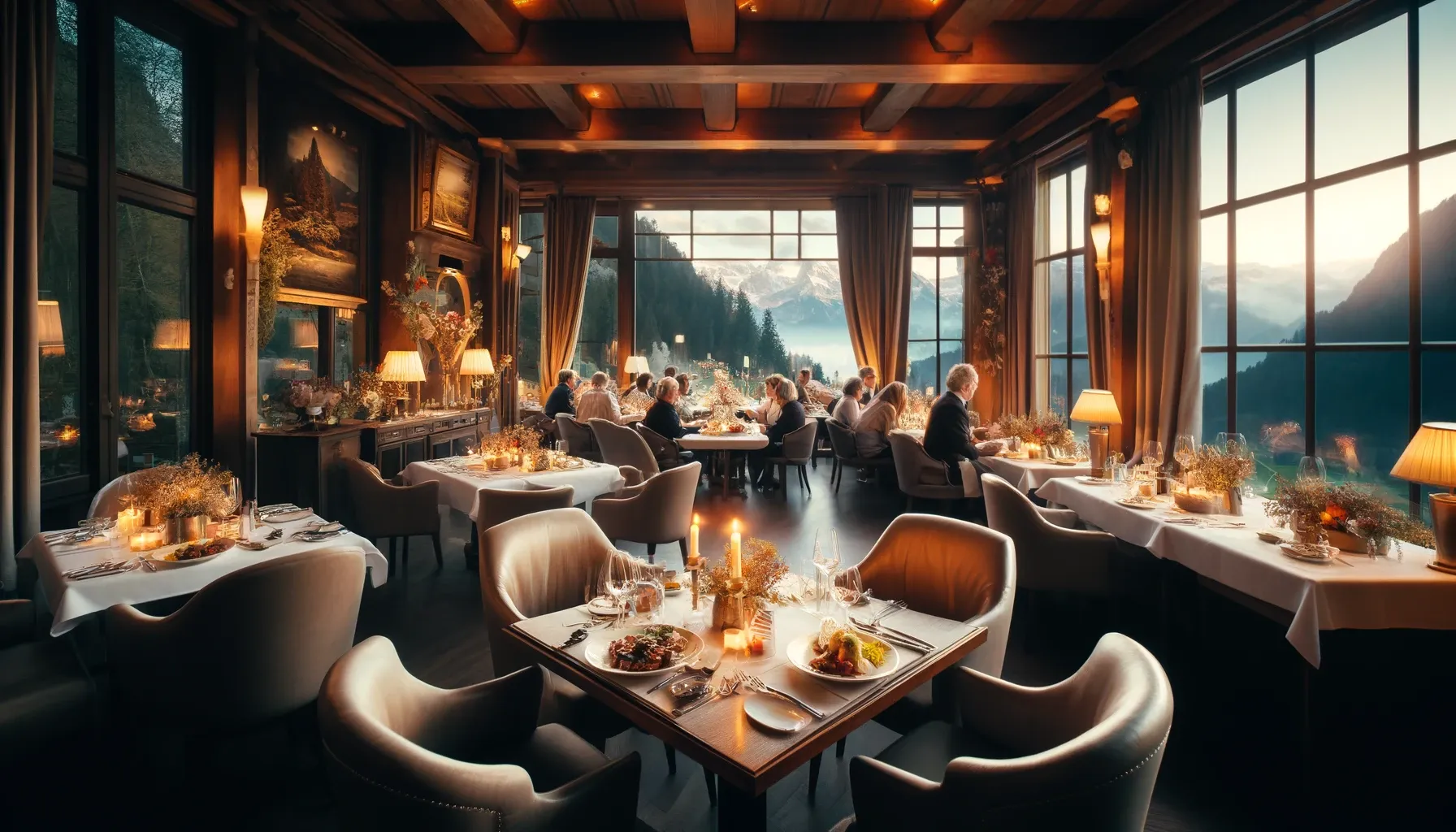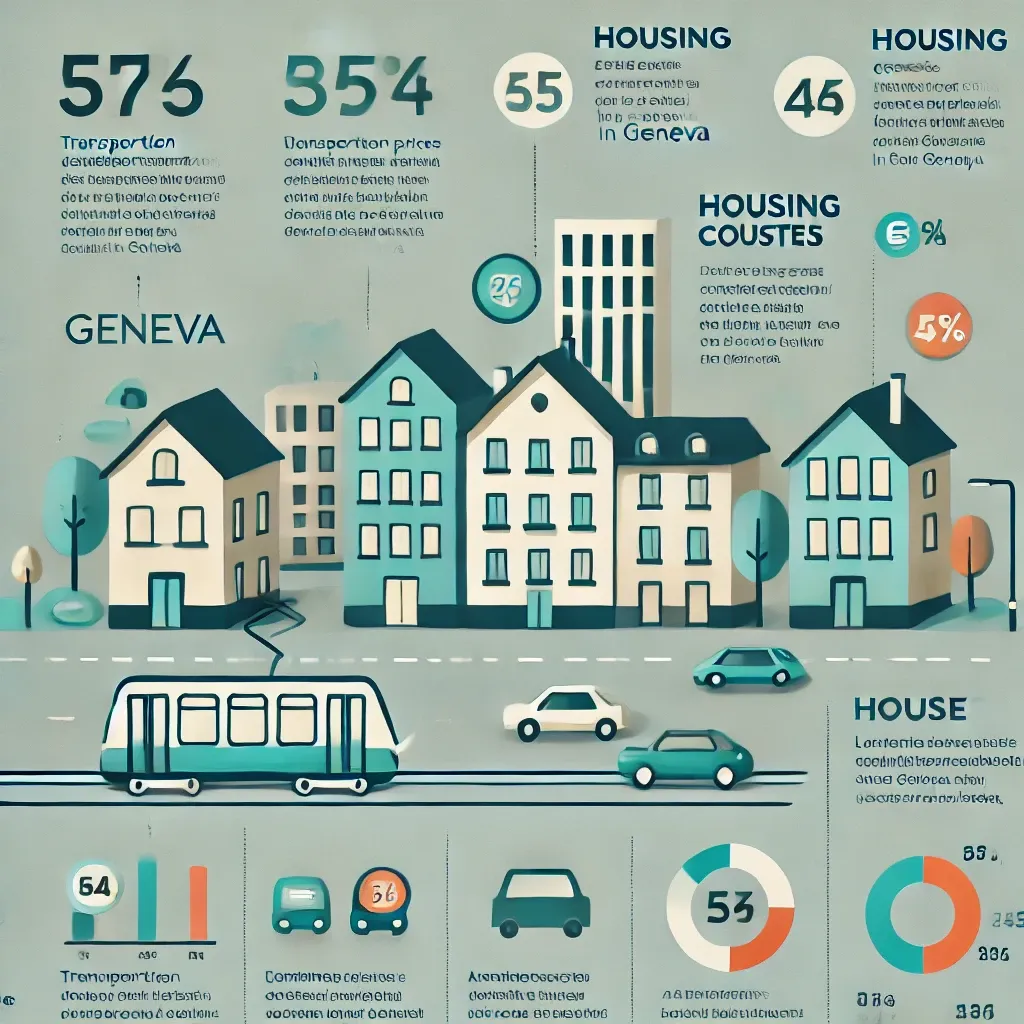What are the main living expenses in Switzerland?

- What are the prices for food and transportation in Switzerland?
- What are the prices for public transport and housing in Geneva?
Food prices in Switzerland
In Switzerland, going to restaurants can be quite a significant expense. The highest rates are fixed in Geneva, as well as in popular ski resorts. For example, if you decide to have lunch in a simple restaurant in Geneva, you will have to pay at least 930 rubles, which corresponds to about 18-30 Swiss francs (CHF). In the country's capital, Bern, lunch is a little cheaper and costs about 750 rubles, or approximately 20 CHF.
Lunch for two
If you're interested in a three-course lunch for two (excluding alcohol), in large cities like Geneva and Zurich, you can expect to pay around 3,700 rubles (80-140 CHF) on average for this meal. In Bern, such a lunch will cost about 3,400 rubles, or around 90 CHF. Local beer in various cities can be found priced between 242 and 255 rubles for half a liter, while a cappuccino in a café will cost between 150 and 186 rubles, which is equivalent to 4-5 CHF. At ski resorts like Crans-Montana or Verbier, prices often exceed those in Geneva by 20-30%.
Tips
As for tips, in Switzerland, like in most European countries, they usually do not amount to 10-12% of the total bill. Tips are often a fixed amount, independent of the cost of the meal, for example, 10 CHF (387 rubles). This is due to the high prices in restaurants.
Food prices
Food prices in the country are also at a high level. The prices for meat stand out in particular, costing between 20 to 80 CHF (775-3,100 rubles) per kilogram. Meat products in Switzerland are renowned for their quality and excellent taste.
- Dairy priceseven a bit lower than Moscow's.
- More than 70%The products are provided by local production.
- Agriculture is booming and local fruits and vegetables are available at reasonable prices.
- Swiss breadIt is valued for its taste, and its price is around 2-3 CHF (75-112 rubles) per loaf.
Wine
When it comes to wine, local producers offer relatively affordable options. A bottle of quality Swiss wine costs on average between 13 and 30 CHF (503-1,162 rubles). In Bern, food prices can be lower by 0.5-1 CHF, while in Zurich, some items may be slightly more expensive than in Geneva.
- Local stores such as Migros and Coop offer reasonable prices.
- Most locals prefer cheese and high-quality Swiss wine, which is often not exported.
Transportation costs
The prices for public transport in Switzerland are also high. For example, a train ticket from Geneva to Sion costs 50 CHF (1,937 rubles) for a journey that lasts about two hours. There are various discounts available when purchasing tickets for certain routes.
- TaxiThey are also quite an expensive mode of transport: a trip from the Zion station to the Nenda resort, located just 18 kilometers away, will cost 90 CHF (3,488 rubles).
- Cost of gasolineremains above the average level, reflecting the overall picture of high prices in the country.
Prices for public transport in Geneva
Prices for public transportation in Geneva look more acceptable compared to other Swiss cities. For example, the cost of a ticket for one trip ranges from 119-130 rubles, which corresponds to about 3.20-3.50 Swiss francs. For comparison, in large cities such as Bern and Zurich, the cost of a similar ticket is about 4 francs, which is equivalent to about 150 rubles.
Subscriptions and their prices
Speaking of transportation passes, a monthly subscription in Geneva costs between 2,600 and 2,800 rubles, which is equivalent to 70–75 francs. Taxis in the city also have various rates: for 1 kilometer of travel, you will have to pay between 100 and 200 rubles, while a liter of gasoline (95 octane) will cost around 67–70 rubles.
General subscription
The Swiss actively use convenient travel systems, among which the most popular is the general subscription (GA). It covers all types of transport services, including ferries and some railways in mountainous areas. For second-class subscription holders, the cost is 3,500 francs (135,658 rubles).
- If one of the family members has a general subscription, others can purchase it at a discount:
- A second adult will get a GA for 2,490 francs (96,511 rubles).
- The third family member costs 2000 francs (77,519 rubles).
- Children aged 6 to 16 can get an annual GA for 1,570 francs (60,852 rubles).
- Youth and students under 30 years old — for 2530 francs (98,062 rubles) per year.
- Persons with disabilities can take out a season ticket for 2,300 francs (89,147 rubles) per year.
- There is also a subscription for dogs that costs 760 francs (29,457 rubles) per year.
Savings on transportation
The expenses for a general subscription quickly pay off, as travel in Switzerland is quite expensive. Additionally, there are options to reduce travel costs through semi-annual subscriptions, which allow you to pay only a partial ticket price. Many local administrations offer their residents platforms for conveniently purchasing one-day tickets at affordable prices.
Housing conditions and utility payments
When it comes to housing and utility costs, they are also high in Switzerland, averaging around 2% of the market value of housing per year, including taxes. Residents of the country typically allocate about 20% of their income to housing expenses. Notably, around 70% of Swiss people live in rented apartments rather than owning their own homes.
Typically, utility expenses for rented housing are significantly lower than for owned properties. For example, the costs for utilities (including heating, electricity, water supply, and garbage collection) for an 85 square meter apartment in Geneva amount to about 200 francs (from 5,600 to 9,300 rubles). In Bern, these costs can be 100 francs higher (10,800 rubles).
Quality of housing
Additionally, it is important to consider the significance of housing quality. In new buildings with good thermal insulation, energy costs are generally lower than in older houses built many years ago.

Conclusion
To conclude this article about life in Switzerland, I would like to once again draw attention to the general level of prices in the country and their impact on the daily life of the Swiss. As I mentioned above, eating out is quite expensive and this discourages many tourists who decide to enjoy the local cuisine. High prices, especially in big cities like Geneva and Zurich, set some limits to the budget, and this is worth considering when planning trips. Howeverquality of productsBoth locally produced and international products often justify their cost. In Switzerland, local products such as cheese and wine are respected, as they not only delight the palate but also support the country's economy.
Public transport
Regarding public transport, it can be noted that the Swiss demonstrate practicality here:high level of pricesThe cost of transportation is offset by convenience and reliability. General passes can significantly reduce costs and make transportation accessible to all segments of the population.
Utilities and housing
It is also important to remember that despite the high utility costs, the Swiss value comfort and quality of life. Modern and well-insulated homes provide the necessary level of convenience, andelectricity costsIt's significantly lower here than in the old housing stock.
Final thoughts
Overall, Switzerland may seem like an expensive country to live in and travel to, buta multitude of advantagesThe quality of life makes it highly attractive for both locals and tourists. Investments in health, leisure, and comfort make life in Switzerland unparalleled, which undoubtedly justifies all the expenses. I hope my article has helped you gain a deeper understanding of the economic aspects of life in this amazing country and may prove useful when planning your trips or relocations.
A trip to Switzerland is not only an opportunity to enjoy magnificent landscapes and a high quality of life, but also a chance to gain a deeper understanding of the culture and traditions of this remarkable nation.
Comment
Popular Posts
9 October 2024
283
9 October 2024
3502

Subscribe to the newsletter from Hatamatata.com!
Subscribe to the newsletter from Hatamatata.com!
I agree to the processing of personal data and confidentiality rules of Hatamatata